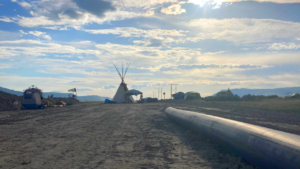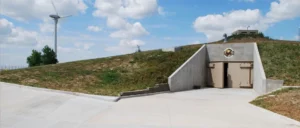National Parks Rush to Clean Up Toppled Trees, Trash After Shutdown
Among the effects of a month-plus with no staff are damaged Joshua trees and elephant seals overtaking a Northern California beach.SALT LAKE CITY—National park visitors cut new trails in sensitive soil. They pried open gates while no one was watching. They found bathrooms locked, so they went outside. One off-roader even mowed down an iconic twisted-limbed Joshua tree in California.
During the 35-day government shutdown, some visitors to parks and other protected areas nationwide left behind messes and repairs that National Park Service officials are scrambling to clean up and repair as they brace for the possibility of another closure ahead of the busy Presidents Day weekend this month.
Conservationists warn that damage to sensitive lands could take decades to recover. Even before the shutdown, national parks faced an estimated $12 billion maintenance backlog that now has grown.
Many of the parks went unstaffed during the shutdown, while others had skeleton crews with local governments and nonprofits contributing money and volunteers.
National Park Service spokesman Mike Litterst in Washington, D.C., declined to provide a full accounting of the damage at more than 400 locations, saying it was isolated and most visitors took good care of the land.
But interviews with park officials and nonprofits that help keep parks running reveal a toll from people and winter storms when workers could not make fixes quickly.
President Donald Trump has said another shutdown could start Feb. 15 if he and Democratic leaders can’t agree on funding for a U.S.-Mexico border wall, compounding pressure on the park service to catch up on repairs.
Hiring seasonal workers who typically start in the spring as rangers, fee collectors and hiking guides also has been delayed.
“We’re kind of ready to just have a bit more stability,” said Angie Richman, a spokeswoman at Arches National Park in Utah.
Arches visitors left human waste outside a restroom, stomped out five trails in a permit-only area that was shut down and damaged an entrance gate to allow vehicles to drive on snow-covered roads when the park was closed after a storm, Richman said.
In some places, less oversight meant animals moved in.
A colony of elephant seals took over a Northern California beach in Point Reyes National Seashore without workers to discourage the animals from congregating in the popular tourist area. Rangers and volunteers will lead small groups of visitors to the edge of a parking lot starting this weekend to safely see the seals and their pups.
At Joshua Tree National Park in Southern California, an off-road vehicle ran over one of the namesake trees and someone cut down a juniper tree, Superintendent David Smith said.
Several other Joshua trees were damaged, including one that was spray-painted, but the park has yet to determine the exact number, he said. Off-road vehicles also created extensive unauthorized trails, with wheel marks dug into the delicate desert soil nearly a foot deep in some spots, Smith said.
Employees at Death Valley National Park found human waste and toilet paper scattered in the desert and evidence people tried to kick in locked restroom doors, said David Blacker, executive director of the Death Valley Natural History Association.
A time-lapse video on Death Valley’s Facebook page showed how it took staffers two hours to clean a restroom overflowing with trash and splashed with waste. Crews also have to rake and replant vegetation to repair ruts from off-road vehicles, which delays work elsewhere in the 3.4 million-acre park.
“It became pretty depressing the kinds of things people will do when they are unsupervised,” Blacker said.
People in Colorado’s Rocky Mountain National Park drove around locked gates and through meadows, spokeswoman Kyle Patterson said.
At Great Smoky Mountains National Park straddling the North Carolina-Tennessee line, visitors cut locks on some gates to closed roads and stole about $5,000 in maintenance tools, spokeswoman Dana Soehn said.
Officials at Zion National Park in Utah, Mesa Verde National Park in southwestern Colorado and Olympic National Park in Washington were fixing trails, roads and campgrounds damaged from winter storms. Mesa Verde wasn’t set to open until Monday, and some areas were still closed at Zion and Olympic.
Campgrounds, visitors centers and trails that seasonal workers help prepare could face delayed openings, and families planning spring break or summer vacations might think twice about visiting if they don’t think national parks are safe or fully staffed, said Phil Francis, chairman of the Coalition to Protect America’s National Parks.
“There are a lot of impacts that will be felt in the future that aren’t being felt or even talked about now,” he said.
Meanwhile, the prospect of another shutdown looms.
Grand Canyon National Park could miss out on its main centennial celebration Feb. 26 and other related events.
Elizabeth Jackson, a spokeswoman for Guadalupe Mountains National Park on the Texas-New Mexico border, noted the stress on workers.
“It’s a way of life if you’re a federal employee,” Jackson said. “Not to be glib, but it’s something we face every year.”
____
Fonseca reported from Flagstaff, Arizona. Associated Press writers Ellen Knickmeyer in Washington, D.C.; David Warren in Dallas; Matt Volz in Helena, Montana; and Dan Elliott in Denver and contributed to this story.
Your support is crucial…With an uncertain future and a new administration casting doubt on press freedoms, the danger is clear: The truth is at risk.
Now is the time to give. Your tax-deductible support allows us to dig deeper, delivering fearless investigative reporting and analysis that exposes what’s really happening — without compromise.
Stand with our courageous journalists. Donate today to protect a free press, uphold democracy and unearth untold stories.






You need to be a supporter to comment.
There are currently no responses to this article.
Be the first to respond.